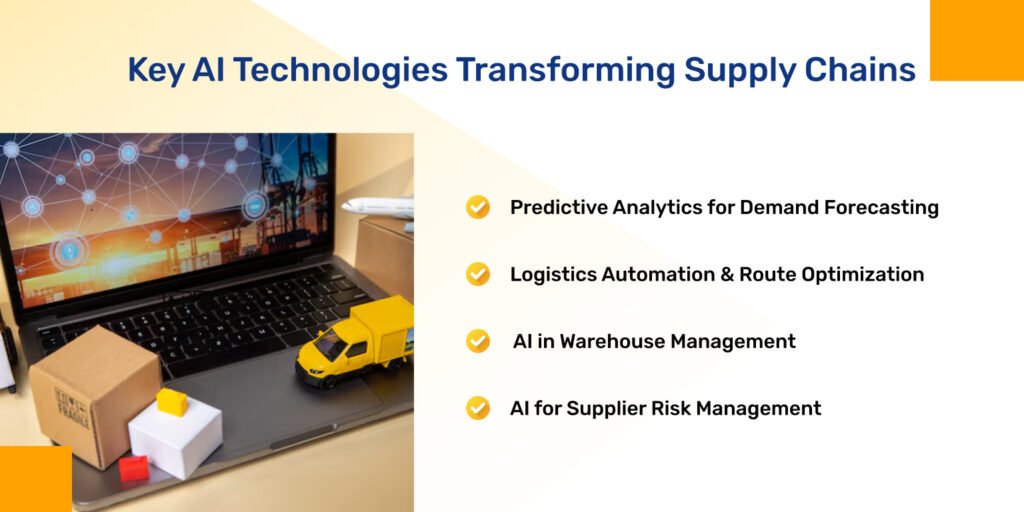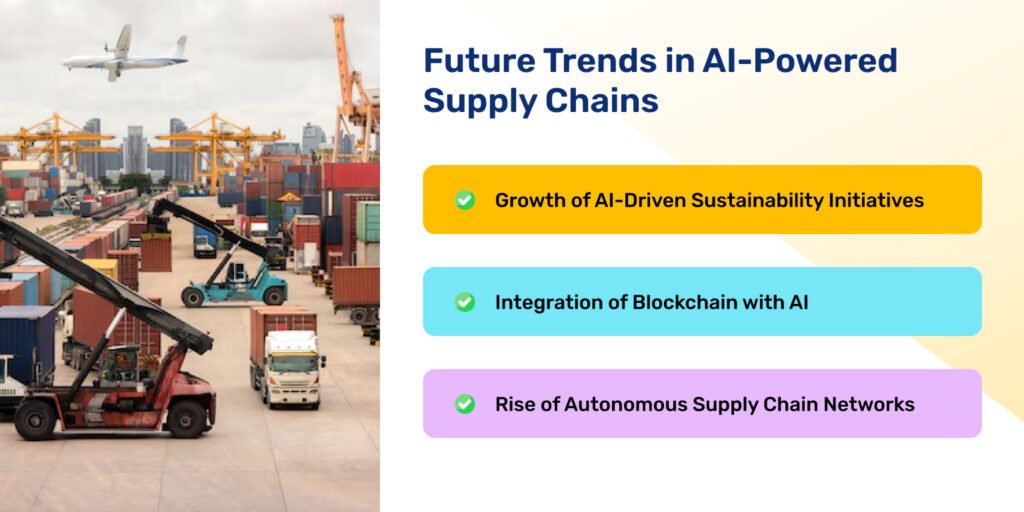In today’s rapidly evolving business landscape, supply chains are no longer just about moving products from point A to point B. With increasing market complexities and customer expectations, modern supply chains demand agility, precision, and real-time responsiveness. AI in supply chain management is emerging as the game changer, enabling organizations to achieve remarkable efficiency, cost-effectiveness, and enhanced customer experience—all while delivering a strong return on investment (ROI).
How can AI revolutionize supply chain efficiency and drive profitability? Let’s explore real-world applications and discover how leading brands are leveraging AI to transform their operations.
Table of Content
Why AI Matters for Supply Chain Optimization
Traditional supply chains have long been plagued by a host of challenges such as delays, inefficiencies, high operational costs, and inventory mismanagement. These issues not only hamper productivity but also adversely impact customer satisfaction and profitability. Enter AI—bringing data-driven insights, automation, and predictive analytics to the forefront of supply chain operations.
- Data-Driven Insights: AI leverages vast amounts of historical and real-time data to analyze trends and make accurate predictions, enabling better decision-making.
- Automation: Routine tasks and manual processes are automated, significantly reducing errors and saving valuable time.
- Predictive Analytics: By forecasting demand and potential disruptions, AI helps companies proactively manage inventory and resources.
The ROI of adopting AI in supply chain management is substantial, as businesses can expect reduced waste, improved efficiency, and a lower total cost of ownership. Moreover, an enhanced customer experience—through faster deliveries and personalized service—is a direct result of optimized operations.
Key AI Technologies Transforming Supply Chains

Predictive Analytics for Demand Forecasting
One of the most impactful applications of AI in supply chain management is its ability to forecast demand accurately. By analyzing historical sales data, seasonal trends, and even external factors like market fluctuations or weather conditions, AI algorithms predict future demand with high precision.
- Real-World Example: Retail and e-commerce giants leverage AI-driven forecasting to maintain optimal inventory levels. This minimizes the risk of overstocking or stockouts, ensuring that supply matches demand.
- Impact: Reduced waste, lower holding costs, and improved profitability are some of the direct benefits of employing predictive analytics.
Logistics Automation & Route Optimization
AI-powered routing algorithms are revolutionizing logistics by optimizing delivery routes in real time. These smart-systems take into account traffic conditions, weather, and road incidents to determine the most efficient path.
- Example: Companies like Amazon, DHL, and UPS have integrated AI into their logistics operations to reduce fuel consumption and delivery times.
- Efficiency Boost: Faster deliveries translate into enhanced customer experience, while the reduction in fuel costs contributes to a significant improvement in ROI.
AI in Warehouse Management
Warehouse management is undergoing a significant transformation, driven by the integration of robotics, IoT, and AI-powered inventory tracking. Advanced systems now monitor inventory levels, predict restocking needs, and even automate picking and packing processes.
- Example: Retail giants such as Walmart and e-commerce leaders like Alibaba are using AI to streamline warehouse operations. Automated systems and smart robotics ensure that products are stored and retrieved efficiently.
- Benefit: Enhanced warehouse efficiency leads to more cost-effective storage solutions and smoother supply chain workflows.
AI for Supplier Risk Management
Managing a complex supplier ecosystem involves mitigating risks such as supply chain disruptions, fraud, and non-compliance. AI-driven risk management tools monitor supplier performance, flag potential issues, and provide actionable insights to minimize risks.
- Case Study: Several companies have adopted AI solutions to detect early warning signs of supplier instability or fraud, thus avoiding costly disruptions.
- ROI Impact: By proactively addressing risks, businesses reduce financial losses and enhance the reliability of their supply chains.
Real-World Examples of AI in Supply Chain Optimization
Many high-performing brands have successfully integrated AI into their supply chain operations. Below are a few standout examples:
- Amazon: Amazon’s warehouses are a marvel of automation, where AI-driven systems optimize inventory placement and order fulfillment. The company’s predictive logistics enable real-time adjustments to delivery routes, ensuring quick and efficient service.
- Tesla: Tesla uses AI to drive supply chain agility and adaptive manufacturing. By closely monitoring production metrics and predicting supply needs, Tesla minimizes downtime and maintains a robust supply chain.
- Zara: In the fast-paced world of fashion, Zara leverages AI for real-time demand forecasting. This allows the brand to quickly adjust production and distribution, ensuring that the latest trends are always available in stores without overproducing.
- Maersk: Maersk employs AI-powered predictive maintenance for its shipping logistics. By anticipating equipment failures before they occur, the company significantly reduces downtime and maintenance costs, while maintaining reliable shipping schedules.
Overcoming Challenges in AI Adoption for Supply Chain Optimization
Despite its many benefits, the adoption of AI in supply chain management is not without challenges:
- High Initial Investment: Small and medium-sized businesses may find the upfront cost of AI solutions daunting. However, cost-effective and scalable AI tools are increasingly available, allowing companies to start small and expand as they realize benefits.
- Integration with Legacy Systems: Incorporating AI into existing supply chain operations can be challenging, particularly when legacy systems are involved. A phased approach and the use of middleware solutions can facilitate a smooth transition.
- Workforce Upskilling: The successful adoption of AI requires a workforce that is adept in new technologies. Investing in training and upskilling initiatives is crucial to ensure that employees can effectively manage and operate AI systems.
How to Implement AI in Your Supply Chain: Actionable Steps
Step 1: Identify Key Pain Points
Begin by analyzing your current supply chain to identify bottlenecks and inefficiencies. Ask yourself:
- Which processes are most prone to delays or errors?
- Where is inventory frequently mismanaged?
- Which areas could benefit most from real-time data insights?
Step 2: Choose the Right AI Tools & Technologies
Research and select AI solutions that align with your specific needs. Consider:
- Predictive Analytics Software: For accurate demand forecasting.
- Logistics Automation Tools: For route optimization and fleet management.
- Warehouse Management Systems: Integrated with robotics and IoT.
- Risk Management Platforms: That monitor supplier performance and potential disruptions.
Step 3: Develop a Cost-Effective Implementation Plan
Plan your AI adoption strategy with a clear budget and timeline. Calculate expected ROI by:
- Estimating cost savings from improved efficiency.
- Projecting reduced operational costs.
- Evaluating potential revenue gains from enhanced customer experience.
Step 4: Monitor Performance & Continuously Optimize
Once implemented, it’s crucial to track key performance metrics such as efficiency gains, cost reductions, and customer satisfaction levels. Use these insights to refine and optimize your AI-driven processes continuously.
Future Trends in AI-Powered Supply Chains

As technology evolves, several trends are set to further revolutionize supply chain management:
- Growth of AI-Driven Sustainability Initiatives: AI is increasingly being used to optimize energy usage and reduce emissions in logistics, contributing to greener, more sustainable supply chains.
- Integration of Blockchain with AI: Combining blockchain’s transparency with AI’s predictive capabilities is enhancing traceability and security across supply chains.
- Rise of Autonomous Supply Chain Networks: Fully automated and self-regulating supply chains are on the horizon, promising even greater efficiency and lower operational costs.
Conclusion
The integration of AI into supply chain management is not a passing trend; it is the future. With benefits such as enhanced efficiency, cost-effectiveness, and a significant return on investment, AI-powered supply chains are setting new industry standards. Businesses that adopt these advanced technologies stand to gain a competitive edge by delivering superior customer experiences and streamlining operations.
Are you ready to optimize your supply chain with AI? Start by evaluating your business needs, identifying key pain points, and exploring the best AI-driven solutions today. Embrace the revolution in supply chain management and drive your business toward a more profitable, efficient, and customer-centric future.
Ready to Advance your Digital Transformation?Get in touch with us.
Discover why Hutech is the right partner for your business.
MAIL US AT
sales@hutechsolutions.com
CONTACT NUMBER
+91 90351 80487
CHAT VIA WHATSAPP
+91 90351 80487
Humantech Solutions India Pvt. Ltd 163, 1st Floor, 9th Main Rd, Sector 6, HSR Layout, Bengaluru, Karnataka 560102




